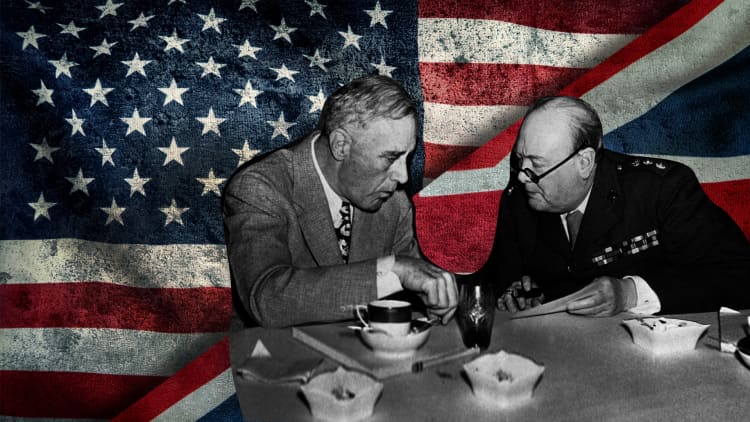President Donald Trump’s visit to the United Kingdom is the latest test for the "special relationship" that has characterized ties between the two countries for more than seven decades.
Political leaders from Winston Churchill to Barack Obama have referred to the U.K.-U.S. relationship as “special” to reinforce shared cultural, economic, diplomatic and military bonds. A closer look at history shows the relationship has been defined as much by the two nations’ differences as their similarities.
Churchill’s special relationship
Winston Churchill coined the term “special relationship” in a 1946 speech in Fulton, Missouri. He said a unique bond between the United States and the United Kingdom was the “only means” by which the world could achieve its “full stature and strength” in the face of communism.
Churchill had established a deep friendship with President Franklin D. Roosevelt throughout World War II, with the two exchanging more than 2,000 telegrams and letters over the course of the war.
"The modern special relationship dates from the combined military relationship of WWII, when Britain ... ran what amounted to a united command with the USA," Tim Oliver, an associate at think tank LSE IDEAS, told CNBC in an email. "That military relationship, and one of trust, remains the heart of the special relationship."
In 1946, the U.S. and the U.K. established the UKUSA Agreement, an arrangement that established an unprecedented level of intelligence sharing between the two nations. Oliver said intelligence sharing, nuclear weapons and special forces are pillars of the special relationship today.
“That is the core that survives — and is often protected — from the vagaries of wider relations, not least presidential and prime ministerial relations," he said.
Dominant partner
The special relationship came under strain in 1956 during the Suez Crisis, when President Dwight D. Eisenhower pressured U.K. Prime Minister Anthony Eden to withdraw British troops from Egypt. The incident was an embarrassing about-face for the prime minister, who resigned two months later.
Experts said the Suez Crisis is one example of how the U.S. has increasingly become the dominant partner in the special relationship since the 1950s.
“The U.S. has a few relationships around the world which in some capacity resemble the relationship it has with the U.K. Britain doesn’t really have another ally like the U.S.,” said Chatham House’s Jacob Parakilas.
British military involvement in Iraq and Afghanistan are other examples of U.S. control over the relationship. Tony Blair followed George W. Bush’s lead and sent troops to Iraq after 9/11, despite strong opposition at home.
One reason for the one-sided nature of the relationship is the sheer size of the U.S. economy. U.S. gross domestic product is nearly $20 trillion, compared to $2.6 trillion in the U.K. The United Kingdom depends on the United States for trade, exporting twice as many goods to the country as to its second biggest trading partner Germany.
“Never forget that there is no such thing as a special relationship in international trade negotiations,” Oliver said.
Cultural ties
Perhaps the biggest role the special relationship has played in history is cultural. Historians point to the bond between President Ronald Reagan and Prime Minister Margaret Thatcher, who shared ideologies about capitalism and free markets.
“You have notable Americans with degrees from British universities, British actors famous in Hollywood,” Parakilas said. “There’s a sense not that the U.S. and U.K. have the same culture, but there’s a lot of crossover in the culture.”
He said cultural ties between the two countries — not least their shared English language — are likely to withstand the ups and downs of political administrations.
“The fundamental truth of it is the strength of the relationship is fairly deeply embedded whether than being sceptical to the day-to-day changes."
CNBC’s Tom Chitty contributed reporting



